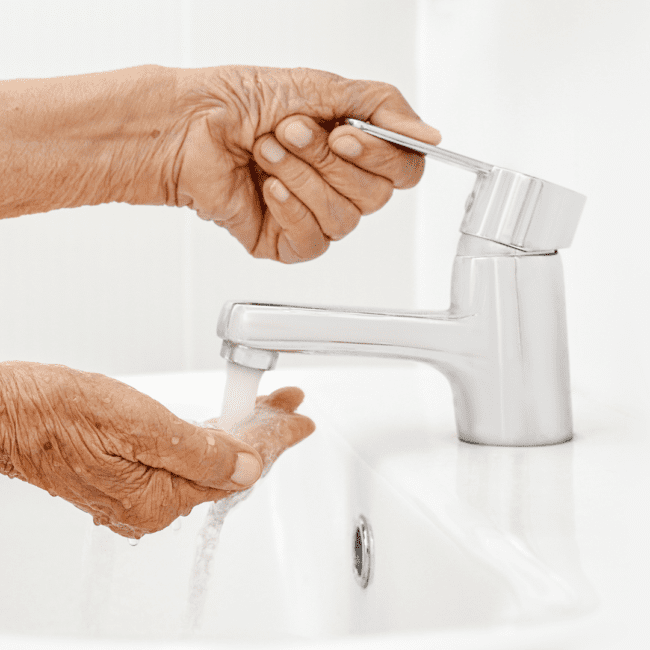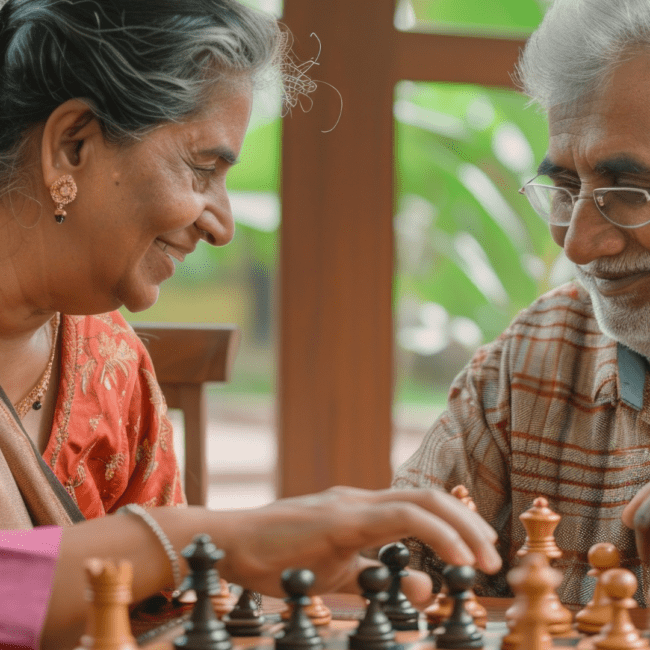When Rajiv, living miles away in Canada, received a call about his father’s declining health back in India, he felt a mix of worry and helplessness. This scenario is all too familiar for many Indians residing overseas, who face the challenge of arranging elderly care in India for their loved ones. It’s not just about finding a healthcare service; it’s about understanding and respecting the deep-rooted cultural aspects that are integral to their parents’ lives.
Elderly care in India is unique, blending traditional values with modern healthcare systems. For those living abroad, making decisions for their aging parents in India involves more than just medical considerations; it’s about ensuring their emotional and cultural needs are also met. This blog aims to simplify the complexities of elderly care in India, offering clear, relatable guidance for those seeking the best for their loved ones. We’ll explore how to bridge the gap between modern healthcare and cherished cultural practices, ensuring your parents receive care that’s not just effective but also culturally respectful and heartwarming.
Cultural Aspects of Elderly Care in India
The traditional family structure in India has always been a cornerstone in the lives of the elderly. Historically, joint families were the norm, where multiple generations lived under one roof, providing a built-in system of social support and care. However, this structure has evolved over time. Urbanization, globalization, and economic factors have given rise to nuclear family setups, especially in urban areas. This shift has significant implications for Elderly Care in India, particularly for those elders whose children now live abroad.
Understanding the role of cultural aspects in caregiving is crucial:
- Respect and Reverence: In Indian culture, there’s a deep-seated tradition of respecting elders. Caregiving is often seen not just as a responsibility but as a way of showing reverence.
- Filial Piety: The concept of ‘Dharma’ or duty towards one’s parents is ingrained in Indian society. This cultural value often guides decisions related to Elderly Care in India.
- Community Involvement: Neighbors and community members traditionally play a role in the social life of the elderly, contributing to their emotional and social well-being.
- Integration with Healthcare Systems: While modern healthcare systems in India have advanced, integrating them with these cultural values is essential. It ensures that the elderly receive care that respects their traditions and lifestyle.
- Legal Rights: Awareness of the legal rights of the elderly is growing in India. This includes rights to property, healthcare, and protection against abuse, ensuring a more secure environment for the elderly.
- Spiritual and Emotional Needs: Indian culture places a high value on spiritual and emotional well-being, which is an integral part of Elderly Care in India.
Healthcare Systems for the Elderly in India
India’s healthcare landscape for the elderly is a complex mix of traditional values and modern medical practices. With the elderly population rapidly increasing, the country’s healthcare systems are adapting to meet the unique needs of this age group. The National Programme for Health Care of the Elderly (NPHCE) is a significant step towards providing comprehensive care, focusing on accessible, affordable, and high-quality services.
Challenges and solutions in accessing healthcare for the elderly include:
Worried about your Elderly parents back home?
Call us today to arrange Care Like Son and Daughter™.
| Challenge | Solution |
| Accessibility: Rural areas often lack adequate healthcare facilities, making access to medical care challenging for many elderly individuals. | Expand healthcare infrastructure and services in rural areas to improve accessibility. |
| Affordability: High out-of-pocket expenses for healthcare can be a significant burden for the elderly. | Implement government initiatives like the NPHCE to make healthcare more affordable for the elderly. |
| Cultural Sensitivity: A gap exists between modern medicine and traditional beliefs. | Train healthcare providers to be culturally sensitive, integrating cultural aspects into healthcare for better acceptance and effectiveness. |
| Social Support: The decline of the joint family system has led to a lack of social support for the elderly. | Develop community-based programs and initiatives to provide social and emotional support for the elderly. |
| Legal Rights: There is a lack of awareness about the legal rights of the elderly, including the right to healthcare and protection against abuse. | Enforce policies and laws to safeguard the legal rights of the elderly, ensuring their right to healthcare and protection. |
Legal Rights and Protections for the Elderly
In India, the legal framework for the protection of senior citizens has evolved significantly, ensuring that the rights of the elderly are safeguarded. The Indian Constitution, under its Directive Principles of State Policy, mandates the state to make provisions for securing the right to work, education, and public assistance in cases of old age. Additionally, various personal laws and the Code of Criminal Procedure recognize the moral and legal duty of children to maintain their parents.
Key aspects of legal rights and protections include:
- Constitutional Provisions: Articles 41 and 46 of the Indian Constitution provide the foundation for legal rights and protections for the elderly, emphasizing the state’s role in ensuring their well-being.
- Maintenance and Welfare of Parents and Senior Citizens Act, 2007: This Act is pivotal in Elderly Care in India, mandating children and relatives to provide maintenance to senior citizens. It also facilitates speedy and inexpensive procedures for claiming maintenance.
- Personal Laws: Various personal laws, including Hindu, Muslim, Christian, and Parsi laws, outline the responsibilities of children to maintain their elderly parents.
- Criminal Procedure Code: Under Section 125, parents can claim maintenance from their children, ensuring a legal avenue for elderly support.
- Government Policies and Schemes: Various government policies, such as the National Policy for Older Persons and the National Council for Older Persons, focus on promoting the health, safety, and social security of senior citizens.
Social Support Systems
In India, the community and government play a crucial role in providing social support to the elderly. The Government of India has implemented various schemes and programs to ensure a dignified and self-reliant life for senior citizens, fostering strong social and inter-generational bonding. These initiatives address the needs of love, care, medical assistance, and housing for senior citizens. Key schemes include the Atal Vayo Abhyudaya Yojana (AVYAY), which focuses on financial security, healthcare, and human interaction, and the Rashtriya Vayoshri Yojana (RVY), providing physical aids and assisted-living devices to senior citizens.
NGOs and private organizations also play a vital role in Elderly Care in India:
- Addressing Health Issues: NGOs provide essential healthcare services, addressing common health issues like diabetes, blood pressure, and heart diseases.
- Catering to Emotional Needs: These organizations offer emotional support and care, crucial for the mental well-being of the elderly.
- Bridging the Generation Gap: NGOs help mitigate the challenges arising from the differences in lifestyles and expectations between the elderly and younger generations.
- Providing a Safe Haven: For seniors facing family issues or neglect, NGOs offer a peaceful and caring environment.
- Complementing Family Care: Recognizing that families sometimes struggle to meet all the needs of their elderly members, NGOs provide supplementary care and support.
The combined efforts of the government, community, and private organizations in Elderly Care in India ensure that the cultural aspects and healthcare systems are aligned to provide comprehensive care. This holistic approach, underpinned by legal rights and social support, is crucial for the well-being of India’s elderly population.
Challenges Faced by NRI Children
For Non-Resident Indian (NRI) children, providing long-distance care for aging parents in India is a complex blend of emotional and logistical challenges. The distance not only creates a physical gap but also an emotional one, as they struggle to ensure the well-being, health, and happiness of their parents from afar. This situation is often compounded by the lack of direct access to healthcare providers or medical records, making it difficult to monitor and manage their parents’ health effectively.
Solutions and resources available to address these challenges:
- Regular Health Check-ups: Encourage parents to undergo regular health screenings and maintain open communication with their physicians.
- Technology-Assisted Care: Utilize technology for remote monitoring and medical care, including video calls and health apps.
- Home Care Services: Opt for personalized home care services that offer support without the need for parents to move into assisted living facilities.
- Financial Management: Assist in setting up automatic bill payments and managing finances remotely.
- Mental Health Support: Pay attention to parents’ mental health, encouraging social activities and regular communication.
- Safety Measures at Home: Ensure the home environment is safe and senior-friendly, possibly through modifications like installing grab bars and removing tripping hazards.
- Emergency Preparedness: Have a robust emergency plan, including contacts for local healthcare services and neighbors.
- Utilizing Professional Services: Engage with healthcare professionals who understand the needs of NRIs and offer comprehensive care for the elderly.
How We Can Help at Samarth Eldercare
Understanding the cultural intricacies of Elderly Care in India is at the heart of what we do at Samarth Eldercare. We know how personal and crucial it is to ensure your aging parents are not just safe but also emotionally content and culturally connected. Our carefully crafted care plans focus on these essential aspects, blending traditional values with the necessities of modern care. Especially for those of you living overseas, managing the well-being of your parents back home can be challenging. That’s where our Elderly Home Care Service steps in, offering you the assurance that your loved ones are in caring hands. We’re here to discuss and tailor a care plan that fits perfectly with your family’s needs, ensuring your parents receive the love, respect, and care they deserve, in a way that feels like home.







